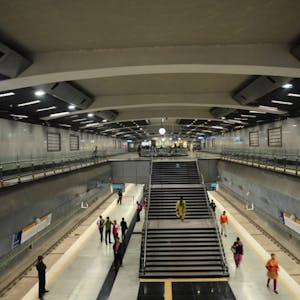Metro Rail Systems and Construction
About this Specialization
The \"Metro Rail Systems and Construction\" specialization comprises three interconnected courses, each lasting 10 to 12 hours. The \"Planning of Metros\" course offers a thorough grasp of Mass Rapid Transit Systems (MRTS), encompassing topics such as Transit-Oriented Development (TOD) and Feasibility Studies. It also covers station planning, MEP systems, Contracts, and Quality in Metros.\\n\\nThe metro rail design course addresses elevated viaducts, substructure, foundation design, and both elevated and underground stations, with a focus on retaining systems for the latter. It provides practical insights into design concepts and foundational principles governing metro rail systems.\\n\\nOn the construction front, the curriculum includes site investigations, construction techniques for elevated and underground metros, tunneling methods, and support systems. Participants gain theoretical knowledge and practical insights to navigate the complexities of metro rail construction effectively.\\n\\nUpon completion, participants will be equipped to contribute to sustainable urban development and enhance public transportation efficiency through adept planning, implementation, and management of metro systems.Created by: L&T EduTech

Related Online Courses
The OCI AI Foundations course is designed to introduce you to the fundamental concepts of AI, Machine Learning, Deep Learning and Generative AI with a specific focus on the practical application of... more
This course will evaluate best practices in transportation networks, thoroughfares, and streetscape designs for the effective movement of people, goods, and services in a region. Sustainable public... more
At the end of this project, you will be able to discover the hidden features of Canva when creating your graphic designs. Canva is a multi-functional platform that will make it easier for you to... more
The shift to cloud-native deployment models and containerized microservices empowers CoSPs to deploy composable applications anywhere in the infrastructure. Transformation technologies for Telco... more
Data never arrive in the condition that you need them in order to do effective data analysis. Data need to be re-shaped, re-arranged, and re-formatted, so that they can be visualized or be inputted... more








